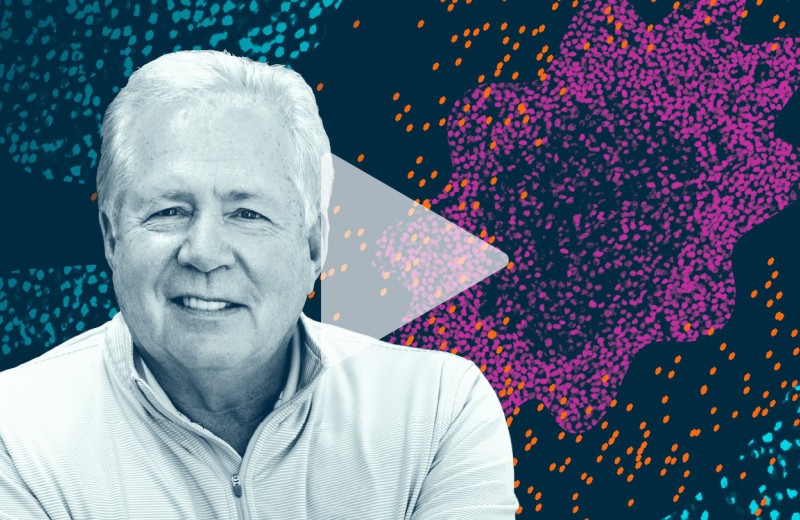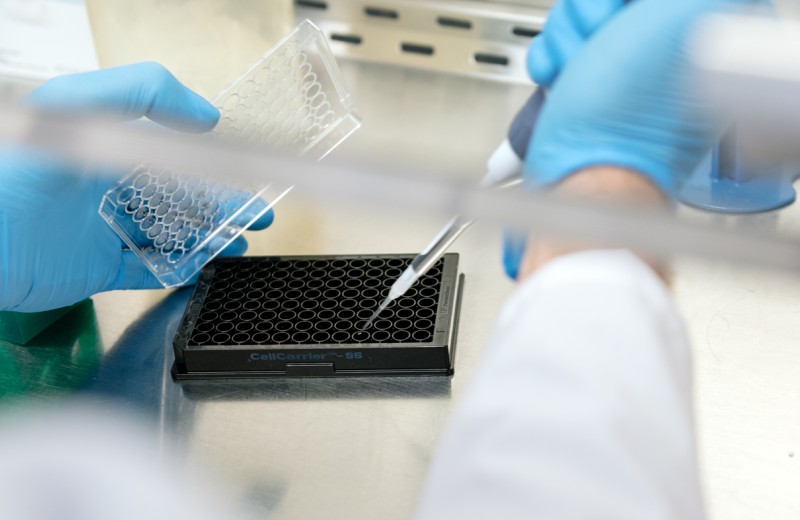Gladstone NOW: The Campaign Join Us on the Journey✕

Thomas Packard, PhD, is a postdoctoral scholar in the laboratory of Warner Greene, MD, PhD. He joined Gladstone after receiving his PhD in immunology from the University of Colorado School of Medicine in 2015.
What brought you to Gladstone?
I’d heard that Gladstone has a great reputation as a place to do a postdoc—“number one in the world”—and so I was interested in the organization when I was first thinking about the path for my academic career. But selecting a postdoc is really about joining the right laboratory, and for that I have to thank my graduate program journal club (see guys: go to journal club!). We had a presentation on the Nature and Science papers from Warner Greene’s laboratory about HIV and pyroptosis—that’s where it clicked that I wanted to go to Gladstone.
What do you like about Gladstone?
First, the great research environment. Second, I really like Gladstone’s commitment to empowering people. I see that commitment in two of the programs that I am proud to be involved with: Gladstone INCLUDES and the Gladstone Postdoctoral Advisory Committee (GPAC). Gladstone Includes has a mission to support women in science, which is something I’m passionate about. GPAC supports postdocs and is a central part of why doing a postdoc at Gladstone is so special.
Were you interested in science as a child?
I have been interested in science for as long as I can remember. My mother trained as a chemist, and as a child, I was fascinated by her old textbooks—though I was much too young to understand them. In elementary school, I read a series about “Encyclopedia Brown” and made it my goal to read the entire encyclopedia (we had a second-hand World Book set). At maybe the age of 12, I read The Hot Zone by Richard Preston about Ebola, and then I read every book in the library about viruses and emerging diseases. I guess I was hooked.
Why did you decide to go to graduate school?
Because I got a 34 on the MCAT and the MD/PhD program wouldn’t accept me. Or maybe my essays weren’t compelling enough…But more generally, I took an immunology course during my undergrad and I was fascinated by the complex processes of the immune system and thought it would be a challenge to try to understand. Well, I was right—it is a challenge!
What do you do when you are not working in the lab?
I know this is also science-related, but recently I’ve become interested in science communication: #scicomm! I like to post my thoughts on my Twitter feed, where I also post links to my blog. I’ve written a few blog articles about HIV, vaccines, and the immune system.
Outside of science, I spend as much time as possible with my wife and daughter. My daughter is 2 years old, and it is fun to watch her learn and play. Our adventures include going to the park or play dates with friends who have kids her age. I also love to golf, which I find to be a great way to relax. Beyond that, there’s a little time for a small circle of friends (including my awesome coworkers!).
If you could learn to do anything, what would it be?
Lead a successful laboratory that makes foundational contributions to science while achieving the perfect work/life balance. No big deal.
What is your hidden/unique talent?
I play the keyboard, and I used to play in bands. One band was a garage rock band, very raucous, and the other was synth pop—both were so much fun! We used to play all over Denver, and it was really great to be involved in the music scene.
Name one thing that not many people know about you.
I’m from a massive family—the oldest of seven. We grew up in Northern Virginia, and we used to pile into a large station wagon like a clown car to drive halfway across the country to visit my grandparents in Minnesota or vacation in Florida. I’m sure it was ridiculous to see, but it was never boring. I’m pretty sure this is why I’m known to be pretty loud—you had to be loud to be heard in that environment.
If you could meet any scientist from any point in time, who would it be and why?
I don’t want to be trite here, but I’d have to say Einstein. Besides how he changed the way we understand the universe, he also just “got it”—look at his quotes. My favorite is “One thing I have learned in a long life: That all our science, measured against reality, is primitive and childlike—and yet it is the most precious thing we have.”
40 Years of HIV Research: Celebrating the Career of Virologist Warner Greene
40 Years of HIV Research: Celebrating the Career of Virologist Warner Greene
Colleagues look back on Warner Greene's 40 year career
Gladstone Experts History HIV/AIDS Infectious Disease Greene LabTips from Virologists to Face the “Tripledemic” This Holiday Season
Tips from Virologists to Face the “Tripledemic” This Holiday Season
Gladstone scientists answer questions about the convergence of COVID-19, RSV, and the flu this winter
Gladstone Experts COVID-19 Infectious Disease Greene Lab Ott Lab Roan LabWhen Will This Pandemic End?
When Will This Pandemic End?
And other questions you have about Omicron and the pandemic
Gladstone Experts COVID-19 Infectious Disease Greene Lab Ott Lab Roan Lab



